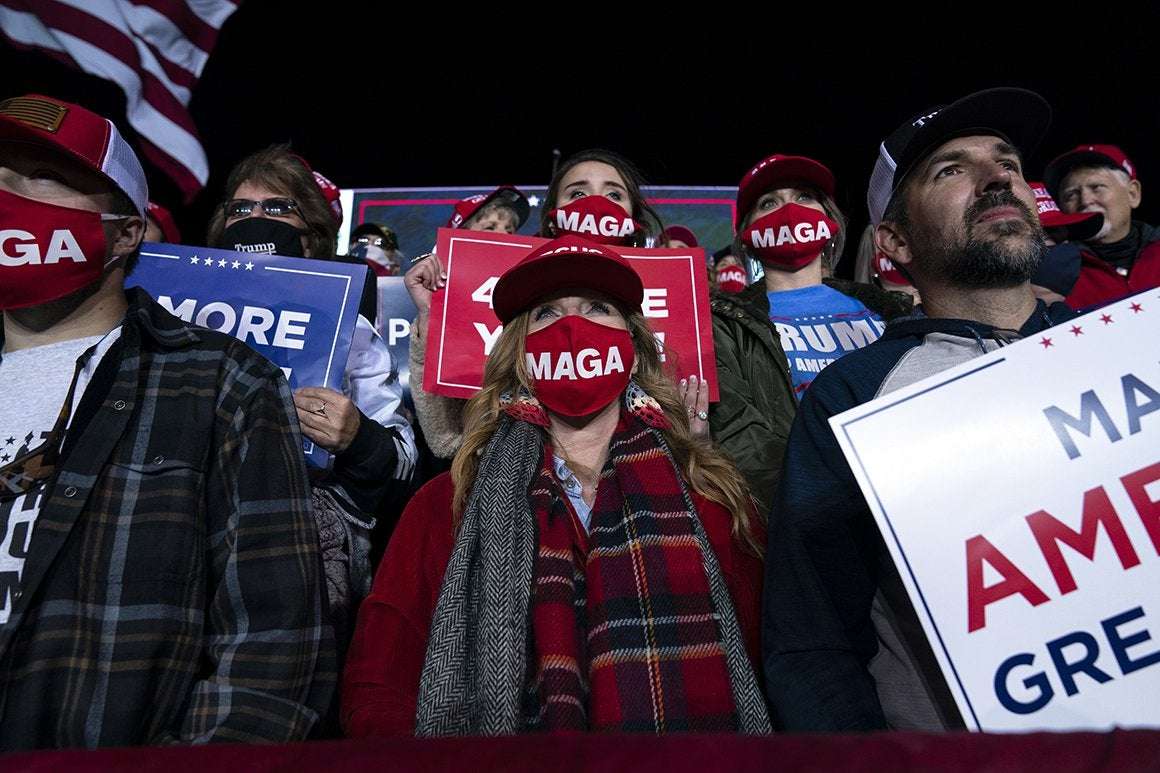If Joe Biden hangs onto his narrow lead, his backers can ask the same question of Trump voters in a spirit of reflection, and possibly even genuine curiosity. Democratic disdain for Trump is natural; disdain for his voters is more problematic. But there is no logical way to scorn Trump without being somewhat scornful of voters who cheered his ascent to power and were eager for him to keep it.
The Trump victory in 2016 was blurry, and therefore relatively easy for people to distance themselves from larger meaning. Hillary Clinton, the logic went, had singular vulnerabilities. There was Russian interference. Lots of Trump voters likely didn’t think he was going to win but were eager to use their votes to send a message of protest to the establishment of both parties. Plenty of people regarded his persona as a flamboyant put-on, and assumed he would embrace moderation and restraint in the event he was invested with real responsibility.
The 2020 results remain blurry but the central question on the table in this election was vividly clear. Is Trump’s norm-shattering governing style OK with you? Former president Barack Obama framed it sharply in at the summer convention: “That’s what’s at stake right now—our democracy.”
Here is an uncomfortable reality for Obama and anyone who agreed with his words. Trump is on track to grow his popular vote total by millions of people, not one of whom could have been under any illusions about what they were voting for. Unlike 2016, there is no way to dismiss this as a flukish accident of democracy, or an illegitimate manipulation of democracy. His support was a robust expression of democracy.
More discomfort: This was a bravura political achievement. Strip it—just for a moment only—from moral context, from the fact that crowded, maskless rallies during a pandemic are flagrantly irresponsible, that many of his words were remorselessly demagogic. In the midst of the coronavirus catastrophe, just weeks after that virus left him in the hospital needing supplemental oxygen, in the face of bad polls and mostly hostile news coverage, Trump raced across the country and came close to winning. He is a movement politician who, with his back to the wall, often demonstrates remarkable moves.
It is not possible, of course, to separate Trump’s political performance from moral context. The argument of the past four years hasn’t been about, say, marginal tax rates in which people may accuse their opponents of greed but in the end can easily split the difference. It’s not even like arguments about abortion rights, in which the differences aren’t easily split and the different sides often view each other with mutual incomprehension. But even in that case, adversaries are in violent opposition to each other’s views, not in violent opposition to the body of institutions, rules and prevailing ethical customs that cumulatively create a democratic culture.
Trump is in opposition to that. There are hundreds of examples but no need to dig through the archives. His overnight appearance at the White House early Wednesday was a fine example. He alleged “fraud” without evidence and asserted, with millions of votes in key states still not counted, “Frankly, we did win this election.”
The origins of Trump’s appeal stretch back decades, in the long-term decline of trust in most American institutions, from government, to Big Business, to the media. In recent years, in part through purposeful political marketing in which politicians and media figures on both ends of the ideological spectrum reap lavish rewards of publicity and money for extreme politics, mistrust has been refined into pure contempt. It was this environment that made Trump possible, and in which he prospered.
But a narrow victory for either side does not fundamentally alter the country’s political balance. This means that the environment that produced Trump-style politics will continue even if Trump is not president. It also means that the opposition party to any president will in many circumstances perceive implacable opposition as being in their interest. In such a dynamic it is better to keep policy disputes as weapons and shields in the ongoing ideological and partisan war than it is to resolve them.
For four years, Democrats have been caught in what might be thought of as the contempt conundrum. The only principled response to Trump’s shredding of norms and defiance of accountability is steadfast opposition. This, at times, can goad them into the same politics of insult and indignation in which Trump thrives. It was no accident that the opportunity to register a verdict on the Trump years inspired surges of new voting on both sides of the question.
The conditions that created Trump will end only when one party or the other achieves a decisive advantage with voters that carries them to unchallenged majority status across Washington and deep into the states. Democrats thought this might be the year that happened. Some 67 million Trump voters—several million less than Biden won but several million more than Trump got four years ago—said not so fast.
When Democrats ask Trump voters “What is your problem?” it is another way of asking themselves, “What is our problem?”

bananaspy on November 5th, 2020 at 00:42 UTC »
They seem to be under this bizarre idea that he was "good for the economy" without ever taking note of the economy he inherited.
Guapscotch on November 5th, 2020 at 00:35 UTC »
It’s very shocking how many people voted trump in the popular vote. Wasn’t expecting that many votes but this country never ceases to surprise me
HardenTraded on November 5th, 2020 at 00:32 UTC »
I'm looking at minorities for Trump and wondering why...